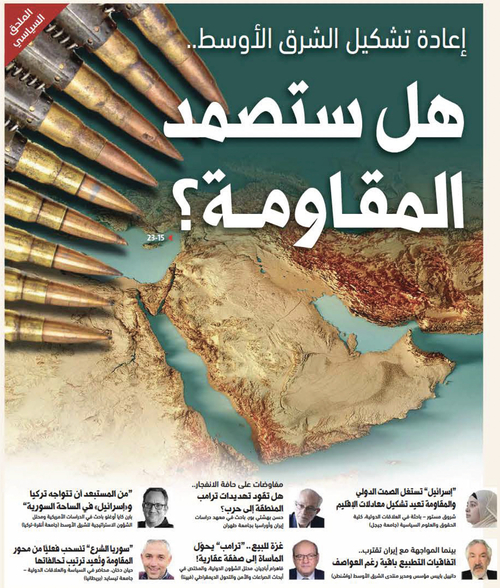Al-Ayyam: What was the logic underlying the normalization in the Abraham Accords?
Daniel Pipes: In his speech at the signing ceremony, Emirati Foreign Minister Abdullah bin Zayed al-Nahyan stated that "this Accord will enable us to continue to stand by the Palestinian people, and realize their hopes for an independent state within a stable and prosperous region." Israeli Prime Minister Benjamin Netanyahu focused in his speech on the "blessings of the peace we make today will be enormous." Those represent two goals. They left unsaid the paramount goal of cooperating – namely, to restrict Iranian influence.
Al-Ayyam: Has the fighting since October 7, 2023 rendered those Accords null and void?
DP: It has certainly challenged them. But none of the five governments has withdrawn, which is noteworthy. And the general wish to restrict Tehran remains as powerful as ever, perhaps more so, though not in Khartoum.
Al-Ayyam: How do you assess Trump's strategy towards Tehran?
DP: He has no strategy, just emotions. Trump has a undisciplined mind and also believes himself smarter than anyone else. The result is policy incoherence. He dislikes the Islamic Republic but does not want to get the United States into a war. He supports the anti-Tehran coalition yet believes in his supreme ability to reach a deal.
Al-Ayyam: Will Trump's actions lead to a de-escalation or to an increase in tensions, especially with the Houthis?
DP: Tensions will likely rise, and sharply so, before they decline. The Iranian position has weakened in the past year due to Israel's blows against Hezbollah and the Houthis, plus the collapse of the Bashar al-Assad regime and the destruction of Iranian air defenses. This could lead to an Israeli or American or joint attack on the Iranian nuclear infrastructure. But Jerusalem has a more central decision-making role here than Washington.
 Aircraft launching in the Red Sea from the Harry S Truman to strike Houthi targets in Sanaa, Yemen, on March 15, 2025. |
Al-Ayyam: What importance has Tehran's change in tone, especially the open discussion of acquiring nuclear weapons?
DP: The long-standing Iranian claim that Khamene'i had prohibited nuclear weapons was transparently false, so the recent change in rhetoric has little importance. It has been full-speed ahead for the nuclear program through decades.
Al-Ayyam: In Türkiye, Recep Tayyip Erdoğan has become more repressive than ever, yet the West turns a blind eye; please comment.
DP: Politics often requires compromises and the West's near-silence on the increasing oppression in Türkiye offers a textbook example of this reality. I do not see this as hypocrisy but as the way of the world; governments owe first priority to their citizens' interests, which in this case means keeping Ankara on-side in the Ukraine war. Many, including myself, wish this were not the case. But, whatever the foreign involvement may be, only Turks, not outsiders, can end Erdoğan's dictatorship.
Al-Ayyam: How do you assess Ankara's role in the Middle East?
DP: Erdoğan has a great opportunity in Syria. Within Türkiye, he faces institutional constraints that limit his ability to turn it into a Islamist state. In Syria, however, he can build on the anarchy to accomplish the jihadist state of his dreams. Relations with Tehran and Riyadh go up and down, as befits rival ambitious Islamist powers. Relations with Israel are terrible on the rhetorical level but much better when it comes to trade or travel; so long as the two states do not clash in Syria, this contradiction will likely continue.
Al-Ayyam: Egypt, Jordan, and Saudi Arabia are all allies of the United States; has their utility to Washington declined in favor of Israel?
DP: Not at all. Note that Trump's first international trip will take him to Saudi Arabia, Qatar, and the United Arab Emirates, pointing to his priority on Arab allies. However, Egypt and Jordan have a lower rank than the Gulf states, in good part because they have little to offer a business-minded politician such as Trump.
